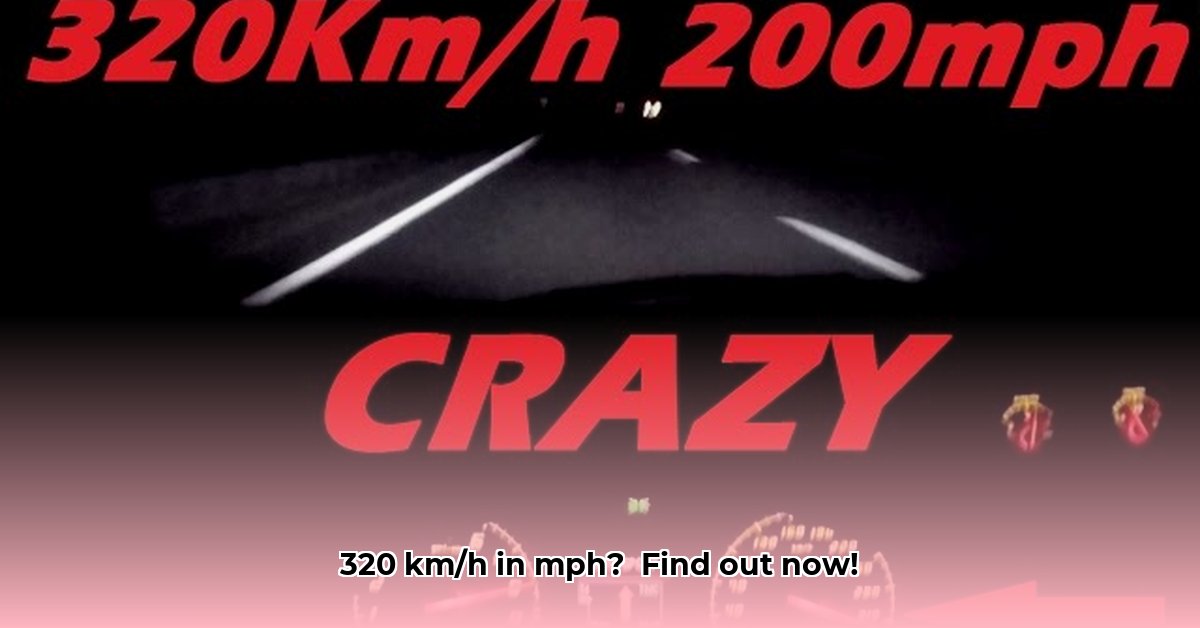Understanding speed conversions between kilometers per hour (km/h) and miles per hour (mph) is essential for various applications, from interpreting international speed limits to analyzing vehicle performance. This comprehensive guide provides clarity on converting 320 km/h to mph and explores the broader implications of accurate speed conversion across different fields. For another example, see this helpful guide on converting 240 km/h to mph: 240 km/h conversion.
Converting km/h to mph: A Precise Approach
The conversion hinges on the relationship between kilometers and miles: one kilometer equals approximately 0.621371 miles. Multiplying a speed in km/h by this conversion factor yields the equivalent speed in mph. Therefore, 320 km/h is precisely 198.83872 mph. This level of accuracy is crucial in fields like engineering and science, where precise calculations are paramount.
Conversion Methods: Exploring the Options
Several methods exist for converting km/h to mph, each offering distinct advantages:
-
Manual Calculation: This method provides a fundamental understanding of the conversion process. By directly applying the conversion factor, you gain insight into the mathematical relationship between the two units. For instance, converting 320 km/h to mph involves multiplying 320 by 0.621371, resulting in 198.83872 mph.
-
Online Converters: Numerous online tools offer rapid and convenient conversions. Reputable websites employ precise conversion factors, ensuring accurate results. These tools are particularly useful for quick conversions in everyday scenarios.
-
Conversion Tables: Pre-calculated tables provide quick lookups for common speed conversions. While less flexible than manual calculation or online converters, they offer a simple solution for standard speeds.
Precision and Practicality: Striking a Balance
While high precision is crucial in certain applications, rounding to a few decimal places often suffices for practical purposes. For example, stating 320 km/h as approximately 198.8 mph is generally adequate in everyday conversations or casual comparisons. However, scientific and engineering contexts demand the highest level of precision to ensure accurate results.
Practical Applications: Where Conversion Matters
The ability to accurately convert between km/h and mph is vital in diverse fields:
-
International Travel: Navigating foreign roads safely requires understanding speed limits displayed in different units. Converting km/h to mph allows drivers to adhere to local regulations and avoid potential penalties.
-
Vehicle Performance Analysis: Comparing vehicle specifications from different manufacturers often necessitates converting between km/h and mph. This enables accurate assessments of acceleration, top speed, and other performance metrics.
-
Aviation and Navigation: Precise speed conversions are essential for flight planning, air traffic control, and other critical aviation operations. Accurate conversions ensure safe and efficient air travel.
-
Engineering and Science: Numerous scientific and engineering disciplines rely on precise speed conversions for calculations, simulations, and data analysis. Accuracy is paramount to ensure the validity and reliability of research findings.
High-Speed Scenarios: The Importance of Precision
In high-speed applications, even minor discrepancies in speed conversion can have significant consequences. For instance, in aerospace engineering, accurate conversions are crucial for calculating trajectory, fuel consumption, and other critical parameters. Similarly, in motorsports, precise speed data is essential for performance optimization and race strategy.
Choosing the Right Method: A Contextual Approach
The optimal conversion method depends on the specific context. Manual calculation provides a deeper understanding of the conversion process, while online converters offer speed and convenience. Conversion tables are useful for quick lookups of common speeds.
Accurate Conversions: Best Practices
To ensure accurate speed conversions, consider these best practices:
-
Use a Precise Conversion Factor: Employing the full conversion factor (0.621371) ensures the highest level of accuracy.
-
Be Mindful of Rounding Errors: Excessive rounding can introduce inaccuracies, especially in high-speed scenarios. Round judiciously based on the required precision level.
-
Verify Results: Double-check calculations or use multiple conversion methods to confirm accuracy, particularly for critical applications.
By understanding the principles of speed conversion and following best practices, you can confidently and accurately convert between km/h and mph in any situation.
- Fix Xbox Games Not Loading Issues on Your Console - February 21, 2026
- How to Fix Xbox One Games Not Loading Past Title Screen - February 20, 2026
- Why Is My Xbox Games Not Loading? Quick Fixes - February 19, 2026
